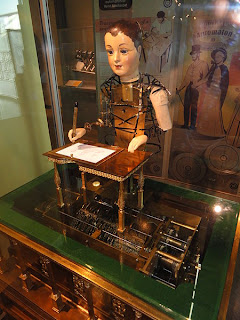 |
| Mechanical Caterpillar by Henri Maillardet |
Often
there are times I look at the articles and pictures that my fellow
artist friends post to share on Facebook, some amusing while other
make me just stare in awe before I save it to my computer. I was just
scrolling through the news feed on my Facebook account when I spotted
something a friend had posted that captured my attention. An article
titled This 200-Year-Old Mechanical Caterpillar Does Everything But Turn Into a Butterfly written by Andrew Liszenwski, though brief,
talks about a beautifully jeweled and enameled mechanical caterpillar
which dates back to about 1820. Personally when looked at this
strangely beautiful creation, my first thought was that it was
somehow a little known work of Fabergé.
I was surprised that within
the article, it's mentioned that it's thought that the creator was
Henri Maillardet. Having never heard of this craftsman, I decided to
go ahead and have a look.
 |
| Draughtsman-Writer by Henri Maillardet |
18th
century Swiss mechanician Henri Maillardet (1745 - ?) actually worked
in London creating clocks and other such mechanisms. It is noted that
he built a spring-activated automation that draws pictures and writes
in both English and French which is known as the Draughtsman-Writer.
This automation creation is on display at The Franklin Institute who acquired it in the 1920s and after several years of painstaking work were able to restore it to working order. If you're interested in seeing it in person:
The
Franklin Institue
222
North 20th
Street
Philadelphia,
PA 19103
(215)
448-1200
While
I looked for other creations that Henri Maillardet, I discovered that
currently on the website for Christie's (an international company
that specializes in fine art auctions) that there is two items of his
currently available in The Dr. Anton C.R. Dreesmann Collection. One is labeled as “A Swiss split-pearl set and
enameled automation formed as a lizard” and the other is “A Swiss
split-pearl set and enameled gold automation formed as a mouse”.
The estimated value of the lizard is £25,000-35,000
($40,337 – 56,472 USD) while the mouse is estimated at
£60,000-100,000
($96,810-161,350 USD). It does make me curious as to the reason why
the lizard would be at a lower price then the mouse. The same amount of care and detail went into both pieces but it perhaps is because lizards and snakes in such a decorative format (much like in jewelry) is not as desirable as something along the lines of an insect or bird. It also depends on the opinion of the individuals who appraised the pair.
After looking at Henri Maillardet's pieces, it does make me wonder if creations such as his and other craftsmen of the 18th century will be seen again or have we as an art community forgotten how to bring into existence something so time consuming and elaborate. Sometimes I think that maybe we have become a little too dependent on computers and programs to do what took our predecessors months and in some cases years to create. I'm not saying anything against the digital art community mind you, since I acknowledge that there is a great deal of skill in itself to do beautifully detailed pieces but it does cause me to raise an eyebrow when someone compliments me on one of my watercolors and asks what program I used to paint it. Perhaps we have simply evolved our trade to work with the ever changing technology in our world, but I think that I will leave such thoughts to my readers to ponder.

No comments:
Post a Comment